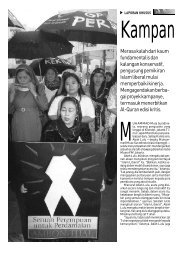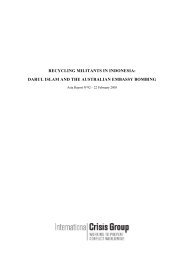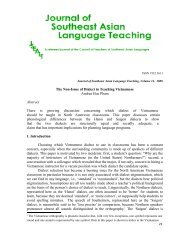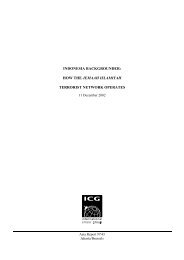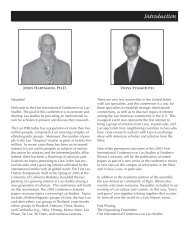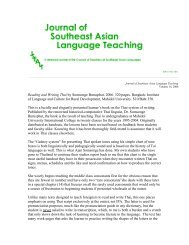jemaah islamiyah in south east asia: damaged but still ... - SEAsite
jemaah islamiyah in south east asia: damaged but still ... - SEAsite
jemaah islamiyah in south east asia: damaged but still ... - SEAsite
You also want an ePaper? Increase the reach of your titles
YUMPU automatically turns print PDFs into web optimized ePapers that Google loves.
ICG Asia Report N°63 26 August 2003<br />
JEMAAH ISLAMIYAH IN SOUTH EAST ASIA:<br />
DAMAGED BUT STILL DANGEROUS<br />
EXECUTIVE SUMMARY<br />
Jemaah Islamiyah (JI), the South East Asian<br />
terrorist organisation based <strong>in</strong> Indonesia, rema<strong>in</strong>s<br />
active and dangerous, despite the mid-August 2003<br />
arrest of Hambali, one of its top operatives.<br />
Though more than 200 men l<strong>in</strong>ked or suspected of<br />
l<strong>in</strong>ks to it are now <strong>in</strong> custody <strong>in</strong> Indonesia,<br />
Malaysia, S<strong>in</strong>gapore, and the Philipp<strong>in</strong>es, JI is far<br />
from destroyed. Indonesian police and their<br />
<strong>in</strong>ternational counterparts have succeeded <strong>in</strong><br />
seriously damag<strong>in</strong>g the network, <strong>but</strong> the bomb<strong>in</strong>g<br />
of the J.W. Marriott Hotel <strong>in</strong> Jakarta on 5 August<br />
provided clear evidence that the organisation<br />
rema<strong>in</strong>s capable of plann<strong>in</strong>g and execut<strong>in</strong>g a major<br />
operation <strong>in</strong> a large urban centre.<br />
The <strong>in</strong>formation emerg<strong>in</strong>g from the <strong>in</strong>terrogation of<br />
JI suspects <strong>in</strong>dicates that this is a bigger<br />
organisation than previously thought, with a depth<br />
of leadership that gives it a regenerative capacity. It<br />
has communication with and has received fund<strong>in</strong>g<br />
from al-Qaeda, <strong>but</strong> it is very much <strong>in</strong>dependent and<br />
takes most, if not all operational decisions locally.<br />
New <strong>in</strong>formation suggests that JI was deliberately set<br />
up as a military organisation and that the division <strong>in</strong>to<br />
units known as mantiqis and wakalahs – orig<strong>in</strong>ally<br />
def<strong>in</strong>ed as districts and subdistricts – was actually a<br />
territorial command structure of brigades, battalions,<br />
companies, platoons, and squads.<br />
All senior members of the central command tra<strong>in</strong>ed<br />
<strong>in</strong> Afghanistan <strong>in</strong> the late 1980s and early 1990s,<br />
before JI formally existed. It was <strong>in</strong> the camps of<br />
the Saudi-f<strong>in</strong>anced Afghan mujahid<strong>in</strong> leader Abdul<br />
Rasul Sayyaf that they developed jihadist fervour,<br />
<strong>in</strong>ternational contacts, and deadly skills.<br />
Afghanistan veterans became the tra<strong>in</strong>ers of a new<br />
generation of mujahid<strong>in</strong> when JI set up a camp <strong>in</strong><br />
M<strong>in</strong>danao from 1996 to 2000 <strong>in</strong> a reciprocal<br />
arrangement with the Moro Islamic Liberation<br />
Front (MILF). The recruits tra<strong>in</strong>ed <strong>in</strong> everyth<strong>in</strong>g<br />
from explosives to sharp-shoot<strong>in</strong>g and <strong>in</strong>cluded not<br />
only JI members <strong>but</strong> also members of like-m<strong>in</strong>ded<br />
jihadist organisations from other parts of Indonesia,<br />
especially South Sulawesi and West Java. This<br />
means that Indonesia has to worry about other<br />
organisations as well, whose members have equally<br />
lethal skills <strong>but</strong> do not operate under the JI<br />
command structure. This background report<br />
describes the emergence of one such organisation<br />
<strong>in</strong> South Sulawesi that was responsible for the<br />
bomb<strong>in</strong>g of a McDonald’s restaurant and a car<br />
showroom <strong>in</strong> Makassar <strong>in</strong> December 2002.<br />
The JI network is held together not just by ideology<br />
and tra<strong>in</strong><strong>in</strong>g <strong>but</strong> also by an <strong>in</strong>tricate network of<br />
marriages that at times makes it seems like a giant<br />
extended family. Insufficient attention has been paid<br />
to the role the women of JI play <strong>in</strong> cement<strong>in</strong>g the<br />
network. In many cases, senior JI leaders arranged the<br />
marriages of their subord<strong>in</strong>ates to their own sisters or<br />
sisters-<strong>in</strong>-law to keep the network secure.<br />
JI also depends on a small circle of pesantrens –<br />
Muslim board<strong>in</strong>g schools – to propagate jihadist<br />
teach<strong>in</strong>gs. Of the more than 14,000 such schools <strong>in</strong><br />
Indonesia, only a t<strong>in</strong>y number are committed to<br />
jihadist pr<strong>in</strong>ciples, <strong>but</strong> there is a k<strong>in</strong>d of JI “Ivy<br />
League” to which JI members send their own<br />
children. Chief among these is Pesantren al-Mukm<strong>in</strong>,<br />
better known as Pondok Ngruki, whose founder, Abu<br />
Bakar Ba’asyir, is believed to have been JI’s amir or<br />
top leader between late 1999 and 2002.





